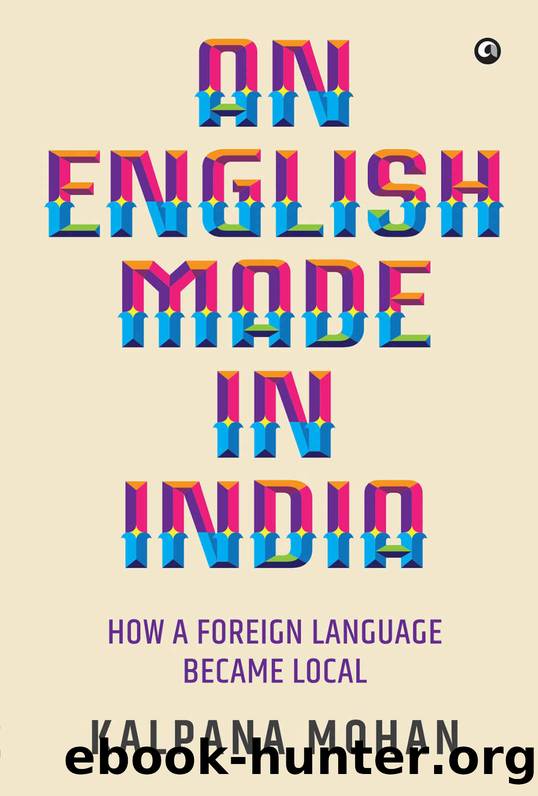An English Made in India: How a Foreign Language Became Local by Kalpana Mohan

Author:Kalpana Mohan [Kalpana Mohan]
Language: eng
Format: epub
Publisher: Aleph Book Company
Published: 2019-09-05T00:00:00+00:00
â
Ganga did not let on that she could not read. On her antiquated phone, my number had the photo of an apple against it. She distinguished each person by a picture. But she knew to squeeze the most out of the basic cell phone, using it to collect debts, make her appointments and put her family members in place using foul Tamil slang that I didnât understand. Sometimes, English sneaked in as on the morning she received a call from a relative from the village.
âNow, you listen to me, you, Iâm going to be dontcare!â Ganga shouted into the tiny black gadget, her left arm on her hip, spit sailing in ten directions from her betel-stained lips. âAnd you can go and tell that turd-brain that Ganga said that to him.â She had just made noun out of a phrase. American English had leaked into the hinterlands of South India, where once women like Ganga used to work, thrusting rice saplings into the wetness of paddy fields. Ganga continued to hiss into her cell phone, rattling off another bucketful of curses at the caller. At the close of her tirade, she told the good-for-nothing at the other end that so-and-so was nothing but a head louse under her broom.
When I expressed my shock to Vinayagam at having heard her say âdontcareâ in the way she had used it, he laughed. He said my ears would burn in embarrassment if I understood Tamil slang well enough. Presently he said âdontcareâ was a Tamil wordâjust like âcoolâ and ânightâ and âtensionâ and âstressâ.
Gangaâs comfort with the English language was significant to me in several ways. I was struck by the number of English words that now weighed down our sentences in the vernacularâeven when we didnât need to use them. I was taken aback most by the way in which English nouns had been subsumed, subverted and transformed into verbs or adverbs to suit the vernacular. Expressions had been transmogrified in strange ways into a language that, at any given time and place, was understood right away by a certain coterie of people. A friend told me how the day he was trying to book a flight in India at a travel agentâs office, the two clerks, both of whom werenât very comfortable in English, spoke to each other in a pidgin English and managed to understand each other perfectly well even though my friend had some trouble with it. I saw it in the interactions of Ganga, Vinayagam and Saravanan who used English words in a particular way and knew what it meant. Vinayagam explained to me that the term âtouch-upâ alluded to making out with a lover. A whole other English, one I wouldnât recognize because it was shorn of all grammar and rules, was being used and referenced on the streets of Chennai by those who hadnât had the privilege of an English-medium education.
It was a world I didnât understand, just as I would never be able to empathize with why someone like Ganga was preoccupied with the notion of caste.
Download
This site does not store any files on its server. We only index and link to content provided by other sites. Please contact the content providers to delete copyright contents if any and email us, we'll remove relevant links or contents immediately.
| Africa | Americas |
| Arctic & Antarctica | Asia |
| Australia & Oceania | Europe |
| Middle East | Russia |
| United States | World |
| Ancient Civilizations | Military |
| Historical Study & Educational Resources |
Never by Ken Follett(2905)
Machine Learning at Scale with H2O by Gregory Keys | David Whiting(2313)
The Man Who Died Twice by Richard Osman(2307)
Fairy Tale by Stephen King(2089)
Will by Will Smith(2060)
Rationality by Steven Pinker(1773)
The Dark Hours by Michael Connelly(1577)
The Dawn of Everything: A New History of Humanity by David Graeber & David Wengrow(1576)
Principles for Dealing With the Changing World Order: Why Nations Succeed and Fail by Ray Dalio(1385)
Friends, Lovers, and the Big Terrible Thing by Matthew Perry(1342)
A Short History of War by Jeremy Black(1304)
HBR's 10 Must Reads 2022 by Harvard Business Review(1259)
Go Tell the Bees That I Am Gone by Diana Gabaldon(1243)
Can't Hurt Me: Master Your Mind and Defy the Odds - Clean Edition by David Goggins(1238)
515945210 by Unknown(1216)
Fear No Evil by James Patterson(1116)
443319537 by Unknown(1079)
Works by Richard Wright(1021)
Going There by Katie Couric(997)
